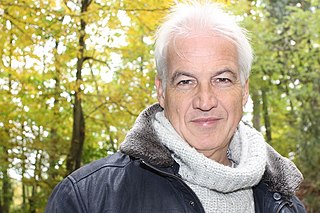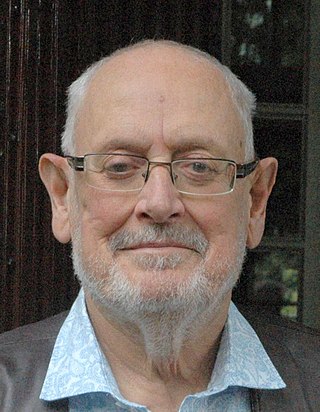
Louis Joseph Andriessen was a Dutch composer, pianist and academic teacher. Considered the most influential Dutch composer of his generation, he was a central proponent of The Hague school of composition. Although his music was initially dominated by neoclassicism and serialism, his style gradually shifted to a synthesis of American minimalism, jazz and the manner of Stravinsky.
Postmodern music is music in the art music tradition produced in the postmodern era. It also describes any music that follows aesthetical and philosophical trends of postmodernism. As an aesthetic movement it was formed partly in reaction to modernism but is not primarily defined as oppositional to modernist music. Postmodernists question the tight definitions and categories of academic disciplines, which they regard simply as the remnants of modernity.
The Netherlands has multiple musical traditions. Contemporary Dutch popular music is heavily influenced by music styles that emerged in the 1950s, in the United Kingdom and United States. The style is sung in both Dutch and English. Some of the latter exponents, such as Golden Earring and Shocking Blue, have attained worldwide fame.
Avant-garde music is music that is considered to be at the forefront of innovation in its field, with the term "avant-garde" implying a critique of existing aesthetic conventions, rejection of the status quo in favor of unique or original elements, and the idea of deliberately challenging or alienating audiences. Avant-garde music may be distinguished from experimental music by the way it adopts an extreme position within a certain tradition, whereas experimental music lies outside tradition.
Contemporary classical music is Western art music composed close to the present day. At the beginning of the 21st century, it commonly referred to the post-1945 modern forms of post-tonal music after the death of Anton Webern, and included serial music, electronic music, experimental music, and minimalist music. Newer forms of music include spectral music, and post-minimalism.

Safri Duo is a Danish electronic percussion duo composed of Uffe Savery and Morten Friis. Initially classically oriented, they later made a track mixing both tribal sound and modern electronica. Released in 2000, "Played-A-Live ", became one of the most popular songs in Europe in 2001. The single and subsequent album, Episode II each sold one million units worldwide, making Safri Duo the most internationally successful Danish act since Aqua.

Frederik Reesen Magle is a Danish composer, concert organist, and pianist. He writes contemporary classical music as well as fusion of classical music and other genres. His compositions include orchestral works, cantatas, chamber music, and solo works, including several compositions commissioned by the Danish royal family. Magle has gained a reputation as an organ virtuoso, and as a composer and performing artist who does not refrain from venturing into more experimental projects – often with improvisation – bordering jazz, electronica, and other non-classical genres.

Michael Maria "Chiel" Meijering is a Dutch composer. He studied composition with Ton de Leeuw, percussion with Jan Labordus and Jan Pustjens, and piano at the Conservatorium van Amsterdam. He composed over 1000 works.
Aksak Maboul are a Belgian avant-rock band founded in 1977 by Marc Hollander with Vincent Kenis, and now revolving around Hollander and Véronique Vincent. Aksak Maboul hasn't stopped changing shape and form throughout its existence, exploring diverse musical styles with their own aesthetic approach.

Willem Breuker was a Dutch bandleader, composer, arranger, saxophonist, and clarinetist.
Kevin R. Gallagher is a guitarist who plays both the electric guitar and the classical guitar. As a classical guitarist, he has received top honors at some of the most prestigious guitar competitions in the world, including the 1993 Guitar Foundation of America, the 1994 American String Teachers Association, the 1993 Artists International Competition, and 1997 Francisco Tárrega Guitar Competition in Spain. As an electric guitarist, he is known for transcribing violin music for electric guitar and for founding the avant-rock ensemble Electric Kompany. He has also produced, in cooperation with John Zorn, a music festival titled "Full Force: The New Rock Complexity" that showcases bands that have combined styles such as classical, rock, jazz, and metal. He has produced a CD for Naxos Records titled "Guitar Recital - Music from the Renaissance and Baroque," a duo CD with Antigoni Goni titled "Evocacion," and an EP featuring his work on solo electric guitar and with Electric Kompany.
TROMP Percussion Eindhoven is a biennial percussion competition and festival held in Eindhoven, Netherlands since 1971. In 2012, TROMP will be organising its fourth percussion competition. It is scheduled to take place from 2 till 11 November 2012.

Rob du Bois was a Dutch composer, pianist, and jurist.

The Noord Nederlands Orkest is a Dutch symphony orchestra based in Groningen. The NNO performs at De Oosterpoort in Groningen and also on a regular basis at these venues in the provinces of Groningen, Friesland and Drenthe:

Michael Nicolella is an American classical guitarist and composer. Described as an iconoclast, he is known for his versatile, adventurous and eclectic approach to repertoire, including the incorporation of electric guitar into his concert programs and recordings. Nicolella's repertoire ranges from the Baroque to the present. His most recent recording is his own arrangement of the complete cello suites of Johann Sebastian Bach; while his past four recordings focused on contemporary music, including his own compositions, alongside those of Toru Takemitsu, Elliott Carter, Luciano Berio, Hans Werner Henze and Steve Reich. He has championed music by such emerging composers as Laurence Crane and Jacob ter Veldhuis and has premiered many works written for him by other composers, including: Joshua Kohl,, David Mesler, Christopher DeLaurenti and John Fitz Rogers, who in 2001 wrote the forty-five-minute piece Transit for Nicolella, scored for electric guitar and computer generated sound. His own compositions include works for solo guitar, chamber music with guitar, a classical guitar concerto, and an electric guitar concerto. His most recent major composition for soprano, guitar and orchestra, The Flame of the Blue Star of Twilight, was premiered by the Northwest Symphony Orchestra and soprano Alexandra Picard in April 2012. He has performed and collaborated with a wide range of groups and artists including: violinist Gil Shaham, rock singer Jon Anderson, best known for his work as lead vocalist in the progressive rock band Yes, broadway legends Bernadette Peters and Brian Stokes Mitchell, the Seattle Guitar Trio, jazz singer Johnaye Kendrick, classical music comedians Igudesman and Joo and is a frequent guest with the Seattle Symphony. Nicolella is a graduate of Yale University, Berklee College of Music and the Accademia Musicale Chigiana. He is currently based in Seattle, where he serves on the music faculty of Cornish College of the Arts. He is married to the painter Ann Gale.

Bart Schneemann is a Dutch oboist, conductor, teacher and artistic director for the Netherlands Wind Ensemble. In 1977 he graduated from the Conservatory in Amsterdam. From 1976 to 1996, he was the first chair oboist in the Radio Filharmonisch Orkest and the Rotterdam Philharmonic Orchestra. He retired from playing in the orchestra to put all his time towards his solo career and his activities in the Netherlands Wind Ensemble. Schneemann plays a wide repertoire in various formations, ranging from older music to contemporary music. Many composers have written music especially for him, including Tristan Keuris, Wolfgang Rihm, John Zorn, Gia Kantsjeli, Kevin Volans, George Crumb, György Kurtág and Jacob ter Veldhuis. He performed solos in various orchestras conducted by, among others: Valeri Gergiev, Edo de Waart, Ernest Bour, Lev Markiz, Frans Brüggen, Roy Goodman and Ton Koopman. Schneeman also conducted the National Youth Orchestra, the Amsterdam Sinfonietta, the Brabant Orchestra and the North Netherlands Symphony Orchestra. As a soloist, conductor and in his capacity in the Netherlands Wind Ensemble, he is often asked for stage performances in all kinds of festivals and events worldwide. Schneemann is a professor at Royal Conservatory of The Hague.

Oud Eik en Duinen is a cemetery in The Hague, the Netherlands, formerly called Eik en Duinen and also nicknamed "the Dutch Père-Lachaise". The cemetery is built around a chapel constructed around 1247 by William II of Holland in honor of his father, Floris IV, Count of Holland. This chapel was partially demolished in 1581, and in the 17th century the area was again used as a cemetery. When Eik en Duinen was full, a new cemetery, Nieuw Eykenduynen, was constructed in 1891 across the road, and since then the old cemetery is known as "Old" Eik en Duinen.

Gooise Meren is a municipality in the province of North Holland, the Netherlands. It has about 58,000 inhabitants and covers an area of about 77 km2 (30 sq mi).

Kees Wieringa is a Dutch pianist, composer, writer and cultural entrepreneur. His mission is to inspire and connect people through art and culture. He came to prominence for his performances of the Dutch composers Jakob van Domselaer, Daniel Ruyneman and Simeon ten Holt.
This article lists some of the events from 1951 related to the Netherlands.












